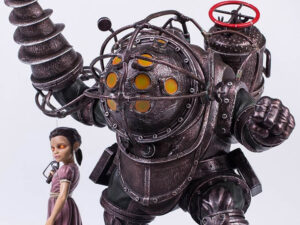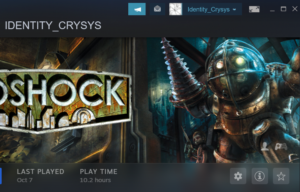
It seems like every aspect of Bioshock as a game can be related directly back to the environment it crafts and the themes it attempts to convey in one manner or another. Your ability to quickly travel between areas is restricted to usage of the bathosphere, Rapture’s own unique method of transportation; no pause menu fast travel for you. Almost every character you encounter directly in a face-to-face setting can be attacked and/or killed, just like you could theoretically do in real life. This applies similarly to NPC’s that do not attack you such as Sander Cohen, who, at least until you attack him first, which is optional, is passive and is not aggressive in the slightest when you finally engage him in person. The exception to this rule is Andrew Ryan but reasoning is provided to this end as well. Because of the power over your very actions he holds by knowing Jack’s conditioned control phrase. All the rules you had been made to learn in the game until this confrontation is suddenly subverted and you realize that you never truly had free will over your actions. Every enemy in Rapture is also profoundly human. To this end, it is extremely difficult to tell the difference between an NPC who will and one who will not attack you on sight. No indication is given in the player’s user interface to imply that any particular figure is unique. Realism like this, or realism as close to what you can achieve in a larger-than-life fictional world, definitely works to this game’s advantage in its impact on the player. When it is employed, the player is made to feel fully immersed in Jack’s shoes, relating his experiences directly to their own and feeling their effects as if they truly were their own.
As for the game’s intended themes, the mechanics contribute to the game’s message as well. Bioshock arguably makes a case critical of unrestrained capitalism. In this world, every man is obliged only to pursue endeavors that will benefit himself and not to let anything get in the way of this objective. Nearly every aspect of the game is explained by this quality. Enemies attack the player as characters called “splicers” looking to gain whatever they can from the player, the resource called “Adam” in particular. A rare motive is provided to the enemies as to why they would be pitted against the player character in the first place, in contrast to other, simpler games that may not have any depth to the antagonistic figures at all. As a character newly introduced from stage one into an overwhelmingly capitalist society, the player has to scavenge for every available resource at the risk of death for themselves. Starting with nothing, the player essentially has to kill and loot others for what they have, all in order to guarantee merely your own survival, with no regard for the value of others’ lives because they do not concern you. The player also has the choice of whether or not to rescue or harvest the little sisters. Rescuing them gives you fewer resources but also puts you on the path toward a moral path and the good ending. Harvesting does the opposite, granting you more resources but resulting in what is considered the bad ending of the game. In short, based on the implications of this system, the player is meant to realize that being kind to others, even when it may not benefit you as much as harming them, is the undoubtedly superior path in life.


(Screenshot of my hours played)
